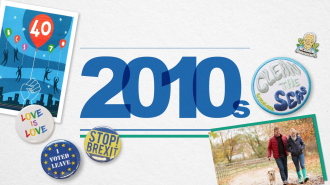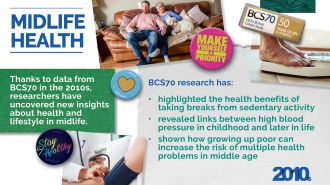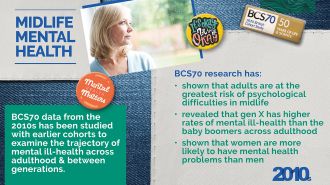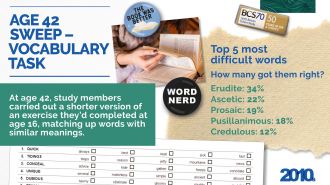- Our studies
- Our research
- Publications and resources
- Data access and training
- About
- News
- Events
- Get in touch
- Join our mailing list
Welcome to our news and blogs section. Here you’ll find the latest developments and insights from across our longitudinal studies.
Growing Up in Digital Europe (GUIDE) is the UK pilot of a major European initiative to create internationally harmonised data for research on child development and wellbeing.

Children conceived through medically assisted reproduction who are born small do just as well in cognitive tests during childhood and adolescence as naturally conceived children who are born a normal weight, finds a new study led by UCL researchers.

Researchers from around the world have been using CLS study data to tackle important questions. Here is a round-up over 40 new pieces of research that we’ve added to the CLS bibliography between October and December 2020.

Celebrating 50 years of the 1970 British Cohort Study – As our look back at the 1970 British Cohort Study through the 2010s draws to a close, let us whisk you away on a tour of the decade just gone by.

Findings from the 1970 British Cohort Study’s Age 46 Biomedical Sweep have helped to improve our understanding of midlife health.

The 1970 British Cohort Study Age 46 Sweep had a significant biomedical focus, with objective health measurements and assessments being conducted for the first time in the cohort members’ adulthood.

Data collected from CLS’s four cohort studies will be used to help improve the understanding of the risk factors, symptoms and treatment of the long term effects of COVID-19, in a major new research project announced today.

Information from the NHS about cohort members’ health care and treatment in hospitals has now been linked to two longitudinal cohort studies, which have collected survey data over six decades – the 1958 National Child Development Study (NCDS) and the 1970 British Cohort Study (BCS70).

Celebrating 50 years of the 1970 British Cohort Study – With five decades of invaluable service to British science and society, what has it been like for our 1970 British Cohort Study members to take part in the study? This week we speak to Fiona.

Almost a third of 17-year-olds have tried cannabis and one in 10 have tried harder drugs, such as cocaine, ecstasy and ketamine, with similar rates of experimentation regardless of parents’ education level, finds a new study by UCL researchers.

The 1970 British Cohort Study (BCS70) has been an important source of evidence on midlife mental health, helping to improve our understanding about why middle age is such a vulnerable period for adults.

With the whole country in lockdown again, the UCL Centre for Longitudinal Studies (CLS) is conducting another web survey of thousands of cohort study participants, to find out how the COVID-19 pandemic continues to affect the lives of different generations of people in the UK.

During the Age 42 Sweep, study participants were asked to repeat a vocabulary assessment they had previously taken in 1986, at age 16.
Ryan Bradshaw
Senior Communications Officer
Phone: 020 7612 6516
Email: r.bradshaw@ucl.ac.uk